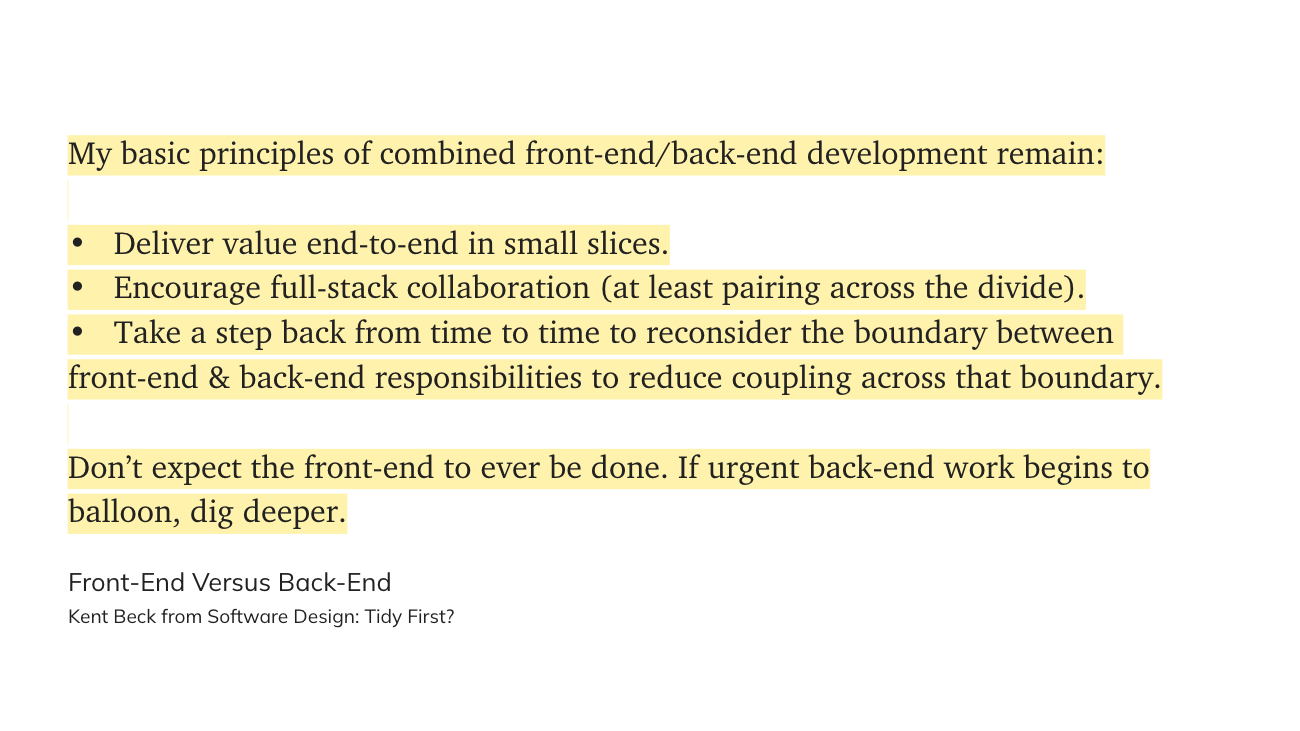Unlock Clarity with Organisational Principles
The core of collaboration: how principles shape our work and fuel progress.

Issue No. 21
As I build this newsletter (and a podcast and YouTube channel) in the open, you will get updates occasionally.
I hope this week's issue finds you well.
This week, I added 📚 A List of Good Books To Read For Leaders to the Free Resources section of my site. In the next few weeks, I have a few spreadsheets and other resources that I plan to add to The Members-Only Area.
I'm also introducing a new section I'm calling "Highlight of the Week", which is my pick of all the highlights I've made this week while reading (I usually spend at least an hour a day reading).
Plus, today, there is a bonus section at the end.
Onwards to this week's issue, which is a topic I have cared about for a long time, Principles!
💬 In this issue, I cover:
- The Bedrock of Success: Why Organisational Principles Matter
- 🛤️ My Journey and Struggle with Principles
- 🧊 The Iceberg Effect: Unseen Forces Shaping Our Work
- 🧭 Principles Are The Philosophies That Guide Us
- 💡 The Advantages of Clarity: How Principles Benefit Organisations
- 🤝 The Collective Power of Co-Creating Shared Principles
- 🐴➡️🛒 Don't Put the Horse Before the Cart: Start with Why
- 🌱 The Delicate Nature of Organisational Values and Principles
- 🔄 When to Bend Your Own Rules
- 🔦 Highlight of the Week
- 🎁🤩 Bonus: A Cool Tool that I found 👉 Lean Coffee Table 👈
🛤️ My Journey and Struggle with Principles
I've been thinking about and collecting articles about principles for years. I have over 62 articles tagged with "principles" in my Reader account and 93 in my Pocket account (which I used before Reader). I'm unsure how many are in my Instapaper account (which I used before Pocket) because my free account won't let me see my tags anymore.
So yeah, I think principles are incredibly important.
Principles will continue to be a recurring topic in this newsletter, and I've already written several times on the subject.
After an organisation or team has agreed on its purpose, mission and vision, then establishing shared principles for how they will work together is crucial to execute together.
It sounds easy, but I have struggled with principles for years.
You see I have a great strength that can also be my Achilles heel. According to the Gallup CliftonStrengths assessment, my top strength is "Belief". Here is a little about that strength (and an insight into what makes me tick):
The Gallup CliftonStrengths "Belief" theme is characterised by having certain core values that are unchanging, which lead to a defined purpose in life. Individuals with a strong Belief theme are often family-oriented and altruistic, and they value responsibility and high ethics. They are driven to act on their values and find meaning and satisfaction in life through living out their core values. This theme falls under the Executing domain of CliftonStrengths, and individuals with dominant Executing themes like Belief are known for making things happen. People with strong Belief talents are seen as dependable and are known for providing stability, clarity, and conviction of values. They can be powerful proclaimers of the truth and can provide organisational stability during times of change by communicating core values that should not change. However, individuals with a strong Belief theme may need to be mindful of being seen as inflexible or intolerant of differing points of view. Coaches can help them explore different theme combinations to either accelerate or soften Belief. To develop and apply the Belief talent, individuals are encouraged to actively cultivate a network of people who share their basic values and to give voice to their values at work. The Belief theme can be a powerful asset in leadership roles, as it can help individuals provide stability, lead meaningful conversations, and be a conscience for their team and organisation.
- Summarised by AI from these citations [1][2][3][4][5].
So, I have strong core values that impact who I am and what I see as my life's purpose.
Unfortunately, if the values and principles around me start falling out of line with my core values and principles, my motivation and engagement can easily spiral downward. As I said, it can be a huge asset and my Achilles heel.
As I've come to understand myself and how systems and organisations work, I have always tried to create clarity by establishing clear principles in the teams I have led.
🧊 The Iceberg Effect: Unseen Forces Shaping Our Work
Most of the time we are focused on execution, getting stuff done. You can think of our ways of working as the top of the iceberg above the water. These are the practices we use, our meetings and rituals, and how we collaborate day-to-day.
However, if we look under the water, we will see the larger part of the iceberg that keeps the tip of the iceberg above the water. This is our purpose, mission, vision and our values and principles.

Most organisations have defined their purpose and have a clear mission statement based on their vision for the world they want to create. Most also take the time to outline their organisation's values. Few have defined some core operating principles.
Sadly, I've worked for long enough to know that it is the exception rather than the rule that an organisation is in alignment with what they have written down. Usually, they are in a part of the employee handbook, shared during your onboarding and then promptly forgotten about for the rest of the time.
Thankfully, I've also had the privilege to work at some companies where everything seems to line up. It is the most amazing experience to work at a company where you feel that, collectively, you are executing towards a shared mission with the same values and principles. Those are the companies that you feel proud to work at. You tell your friends and family about where you work and recommend people you know to work there. You feel you are doing some of your life's best work.
🧭 Principles Are The Philosophies That Guide Us
Principles are different than your values, they are a guiding philosophy. For example, Facebook initially had a well-known principle: "Move fast and break things". This clarity proved successful for them.
Establishing principles at the organisational, departmental, and team levels is powerful and can change over time, depending on the organisation's needs. It's vital to establish, operationalise, and maintain these principles.
💡 The Advantages of Clarity: How Principles Benefit Organisations
Having shared principles helps because they:
- Promote a unified way of working: Shared principles ensure that all team members work towards the same goals and share a common understanding of the organisation's values.
- Improves communication: Clear principles facilitate better communication among team members, providing a shared language and framework for discussing issues and making decisions.
- Enhances collaboration: When everyone in the organisation adheres to the same principles, it fosters a collaborative environment where team members can effectively work together and support each other.
- Increases efficiency: With well-defined principles, team members can make decisions more quickly and confidently, leading to increased productivity and streamlined processes.
- Boosts employee engagement: When an organisation has clear principles that align with employees' values, it contributes to a positive workplace culture and higher employee satisfaction, ultimately resulting in increased engagement and retention.
🤝 The Collective Power of Co-Creating Shared Principles
When creating principles, the best approach is to involve everyone, utilising the IKEA effect. This way, instead of leadership deciding the principles, everyone's input through co-creation leads to increased buy-in and adherence.
While top-down principles can be operationalised, as seen with my Facebook example, ensuring they are followed can be more challenging.
🐴➡️🛒 Don't Put the Horse Before the Cart: Start with Why
Having principles is crucial, but it's essential to first Start With Why. This means understanding your organisation's purpose, vision, mission and values. Once you have these foundational elements in place, you can start defining your principles for how you will operate.
🌱 The Delicate Nature of Organisational Values and Principles
A word of caution: mission, vision, values, and principles form a fragile structure requiring constant maintenance. If not tended to, they can quickly lose their meaning and impact. Thus, it's essential to continually nurture and uphold these foundational aspects of your organisation.
Factors that can cause principles to fall apart or fade away include:
- Lack of clarity or communication: If the principles are not communicated or understood by all team members, it can lead to confusion and inconsistent adherence.
- Leadership fails to inspire and empower people to follow the organisation's principles: People may feel less inclined to follow the principles when leaders do not actively promote or adhere to the principles. On the other hand, when leaders demonstrate their commitment to the principles and empower employees to do the same, it can create a strong, positive company culture.
I've seen first-hand how a CEO change can bring about a wholesale shift in company culture, sometimes for the better, sometimes for the worse!
Unfortunately, in one company I worked at the new CEO said they didn't believe in the values their predecessor had spent two years co-creating with staff and operationalising in their first week! You can imagine what happened next. - Inconsistency: If the principles are applied inconsistently or selectively, it can undermine their credibility and discourage adherence. Organisations must operationalise their values and principles in the day-to-day fabric of an organisation and leaders at every level must remind and reinforce these principles during decision-making.
- Lack of accountability: Without operationalising the principles and integrating them into the culture and everyday actions of employees, staff may not feel compelled to adhere to them, leading to a gradual decline in commitment.
- Misalignment with individual values: Employees may be less likely to follow the organisation's principles if they do not personally align with them.
I think this is going on right now in many organisations where leadership is trying to get everyone to return to the office. - Organisational changes: Mergers, acquisitions, or significant restructuring can disrupt established principles and confuse which values should guide behaviour.
I've also seen first-hand how an acquisition can radically change an organisation; even when the two companies are kept separate to preserve the culture of the acquired company, changes creep in through things like a new, more restrictive expense policy or a change in the back-office tooling like the HR system. - Competing priorities: In some cases, organisational priorities or pressures may conflict with established principles, causing employees to prioritise other goals over following the principles. (See "When to Bend Your Own Rules" below).
In conclusion, to prevent principles from losing significance, it's essential to uphold and put them into action, ensuring they stay at the heart of your organisation's decision-making process.
🔄 When to Bend Your Own Rules
It's acceptable to go against principles occasionally. There are always exceptions.
However, I strongly recommend documenting why you are breaking a principle in a particular situation. This act of documentation is part of operationalising your principles.
In a Theory Y organisation, I would certainly expect that the operating principles would continually adapt in response to employee feedback and changing circumstances, rather than just documenting the exceptions.
🔦 Highlight of the Week
This quote by Kent Beck is a great reminder for how product teams should work, regardless of the different "stacks" in the team.

🎁🤩 Bonus: Lean Coffee Table
I've been using the Lean Coffee as a way to facilitate meetings for quite some time now. I think it is a fantastic format to ensure everyone's voice is heard and that we surface all the topics on people's minds, talking about the most important ones while using timeboxing to stay on track.
Lean Coffee Table is a really cool tool to facilitate meetings using the Lean Coffee format that I used with some friends this week and I loved it straight away.
If you use Lean Coffee already or you would like to try it out, I highly recommend this tool over using something like Miro, Trello, Notion, Confluence etc (I've tried all of these and Lean Coffee Table is way better).
💬 If you had some thoughts while reading this, I would love to hear them in the comments.



